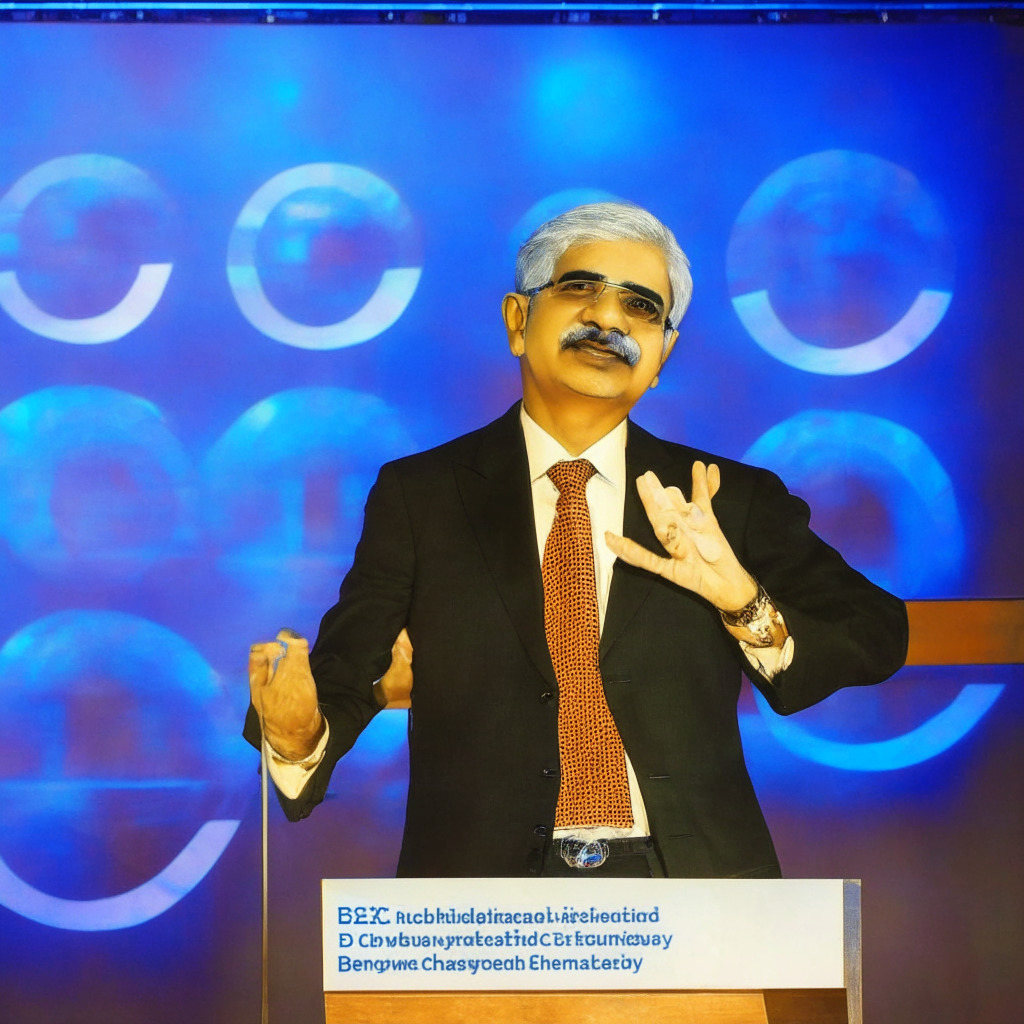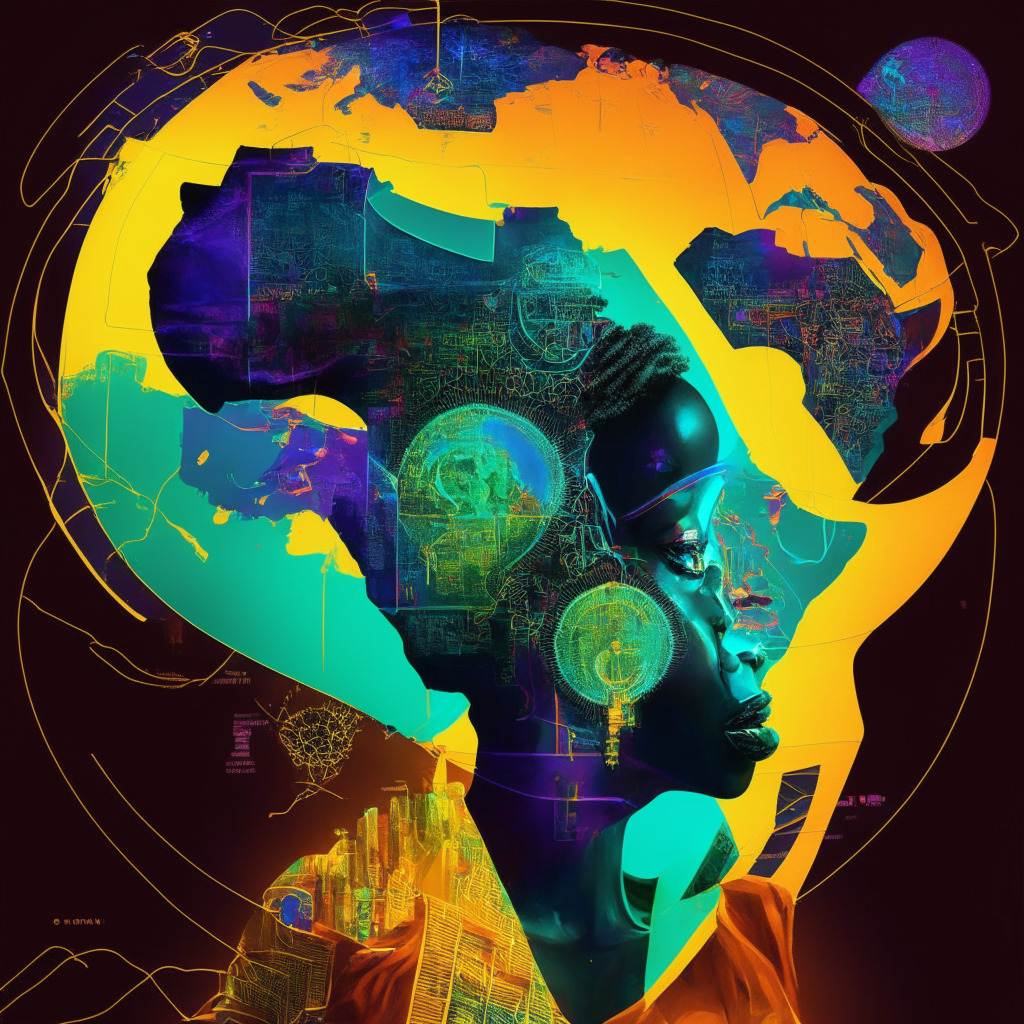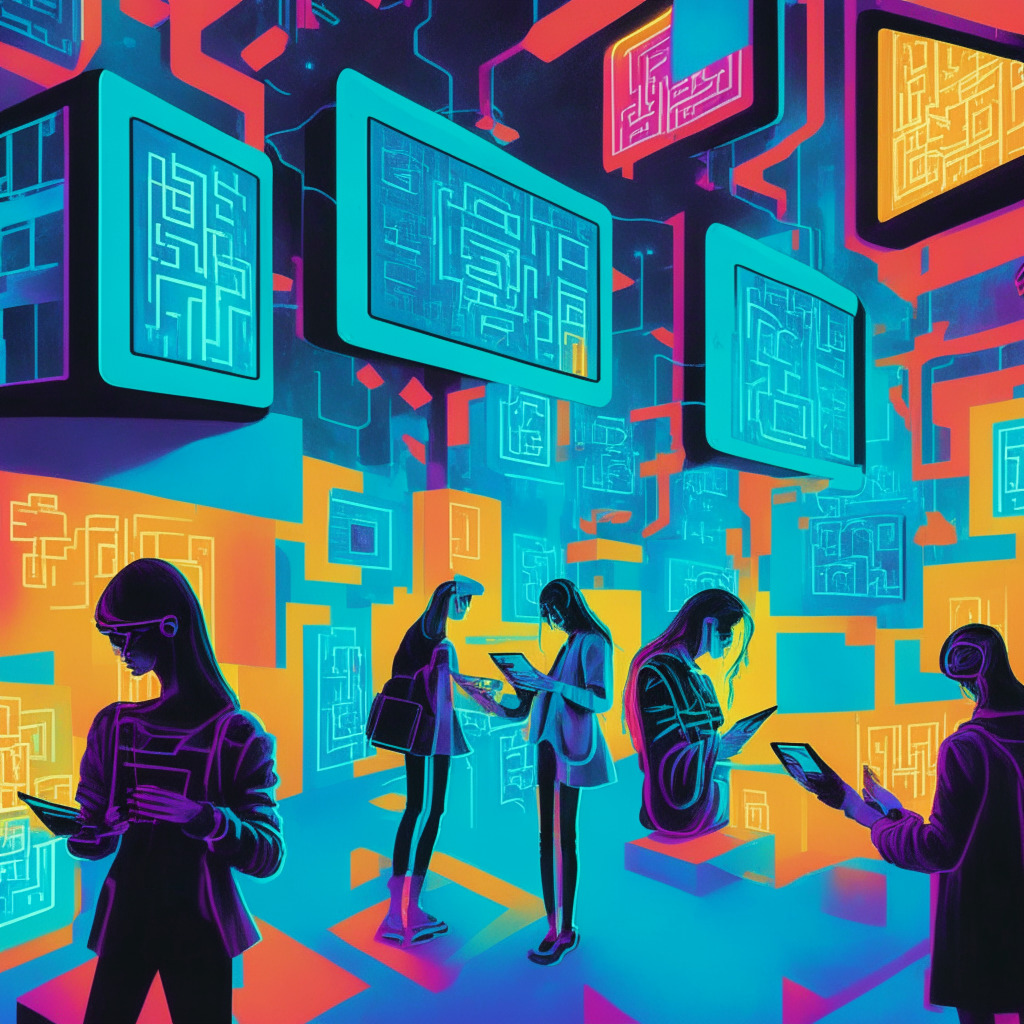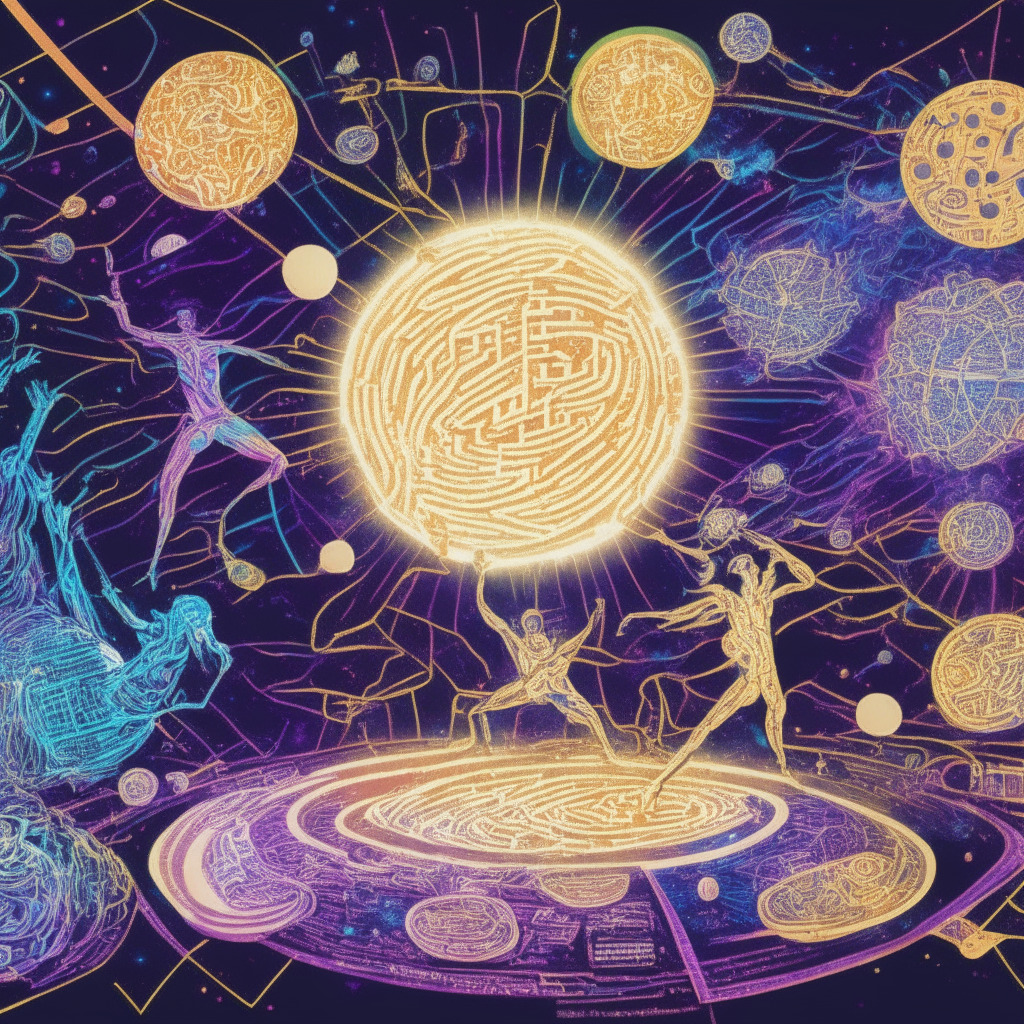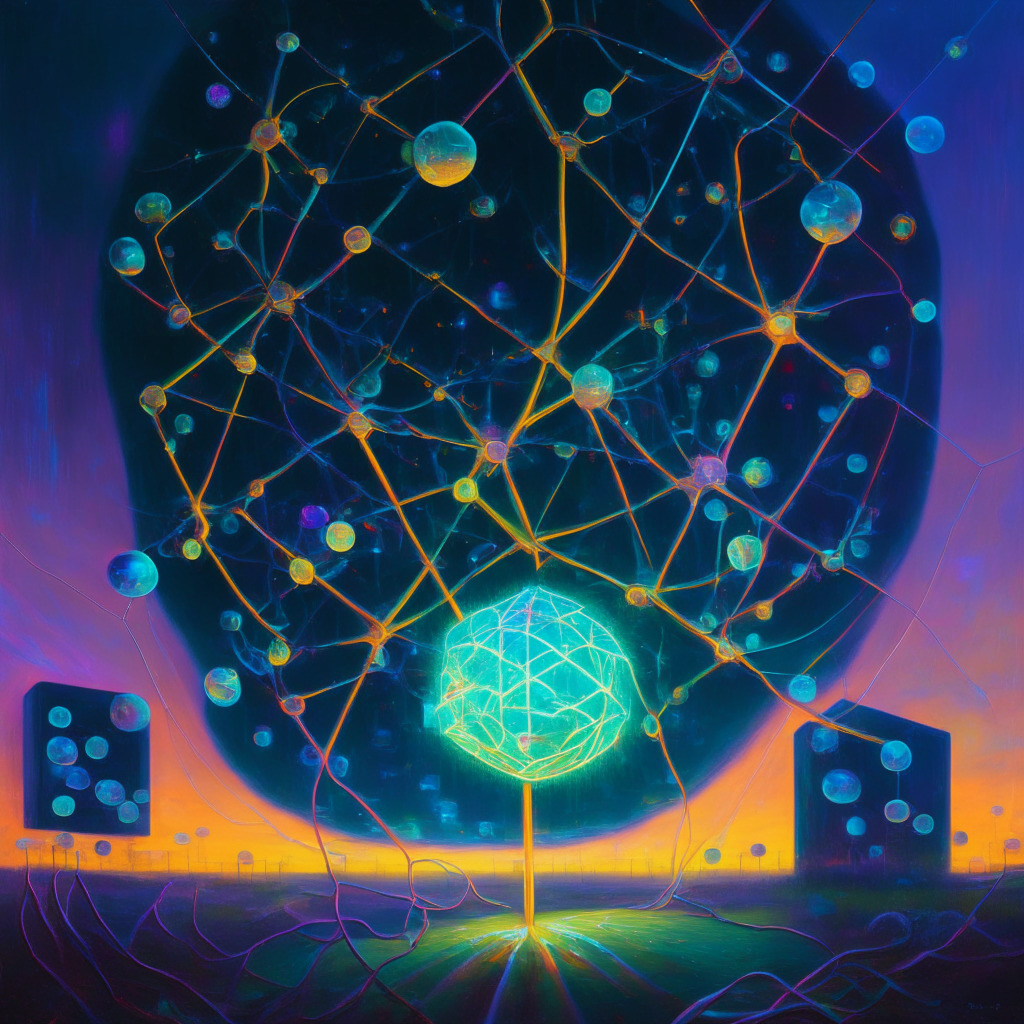Mu Changchun, the head of a Chinese Central Bank, asserts that the digital yuan could revolutionize retail payments nationwide, potentially outshining cash. He urges banking and e-pay allies to optimize QR Code protocols and encourages merchants to embrace e-CNY as a viable payment mode.
Search Results for: Revolut
GenTwo’s Bold Move: Revolutionizing Investment Landscape or Silencing Stability?
Fintech platform GenTwo, known for securitization, has raised $15 million in a Series A funding round led by Point72 Ventures, announces the firm. This event raises intended expansion to international presence, promising a significant impact on the global fintech landscape.
Unleashing the Power of CBDCs: India’s Approach to Revolutionizing Global Finance
Reserve Bank of India’s Governor, Shaktikanta Das, emphasized the transformative potential of Central Bank Digital Currencies (CBDCs) in a recent G20 TechSprint Finale address. He outlined their potential to revolutionize international payment landscape by reducing costs and increasing transparency. India, currently testing its own CBDC, engages in comprehensive data collection and analysis for future policies. They also invite innovative solutions for cross-border CBDC platforms.
The Micro Revolution in Bitcoin Mining: Pocket-Sized Devices Against Industry Secrecy
Micro Bitcoin mining devices are small, cost-effective tools that aim to defy the secrecy and exclusivity associated with Bitcoin mining. Bitmaker’s devices, costing around $3, offer accessibility and transparency, fostering understanding and community participation in cryptocurrency despite limited profitability. These innovations symbolize a step towards democratization and decentralization in the crypto world.
Blockchain Future: Balancing the Pitfalls and Potentials of a Digital Revolution
“Blockchain technology offers potential benefits like improved transaction speed, efficiency, and security. However, the future of these systems faces challenges like regulatory interventions, cyber threats, and market volatility. Despite these issues, blockchain and cryptocurrencies hold significant revolutionary potential in our financial systems.”
Decoding Future Taxes: Is the Metaverse A New Tax Haven or a Revolutionary Taxation System?
“Harvard legal scholar, Christine Kim argues the metaverse should be taxed immediately, as significant wealth is generated by users through real economic activities. Kim proposes immediate taxation and two enforcement methods: platforms withholding taxes or a ‘residence taxation’ module for users.”
Unveiling MetaCene: Revolutionizing Blockchain Gaming or Creating a Risky Bubble Economy?
MetaCene, a next-generation blockchain MMORPG developed with an investment of $5 million, aims to redefine civilizations through player interactions with in-game non-fungible tokens (NFTs). Incorporating AI and blockchain technologies, MetaCene departs from conventional gaming, focusing less on financial gain and more on pure gaming experience.
Incredible Crypto-Awareness in Nigeria: An Unforeseen Leader in the Blockchain Revolution
In a recent survey by Consensys, 99% of Nigerians reportedly understand cryptocurrencies, making Nigeria the global leader in crypto-knowledge. Despite regulatory hurdles, 90% of respondents plan to invest in cryptocurrencies, viewing them as protection against hyperinflation. The survey underscores increasing global adoption of cryptocurrencies, particularly in economically troubled regions.
Blockchain Revolution in Traditional Asset Trading: The London Stock Exchange Leap and Its Implications
London Stock Exchange (LSE) Group is aiming to revolutionize traditional asset trading with the incorporation of blockchain technology. This new system proposes a smoother, cheaper, and more transparent process for handling traditional assets, ensuring reliability for investors. However, the integration faces hurdles, including security concerns and effectiveness of legacy systems with new technologies.
Fusing AI and Classic Analytics: A Look into yPredict’s Revolutionary Forecasting Approach
“yPredict, a new project under development, aims to revolutionize financial forecasting by blending traditional analytical methods with modern AI technologies. It intends to democratize predictive analytics by introducing a subscription-based Prediction Marketplace, transforming financial data scientists’ earning platform and unlocking new market potential.”
Web 3 Dilemma: $1.2 Billion Lost to Hacks and Fraud Amid the Blockchain Revolution
“The digital ecosystem of Web 3 platforms has reported a loss of over $1.2 billion this year due to hacks and rug pulls, states web3 bug bounty establishment, Immunefi. With heavy losses in August 2021, Ethereum witnessed the most manifold of attacks. Hacks clearly outweighed frauds as the root cause of these financial missteps. These financial drains highlight the need for thorough scrutiny of blockchain technology’s defense mechanisms.”
Crypto Campaign Donations: Revolutionizing Political Funding or Publicity Stunt?
“Crypto campaign donations are gaining traction in the political arena, with key figures including Florida Governor, Ron DeSantis, considering their acceptance. Yet, concerns over their implications prompt considerations for regulations and possible contribution limitations.”
Exploring Vietnam’s Meteoric Rise in Crypto: A Financial Revolution Amid Contradictions
“Vietnam leads in global crypto adoption with 76% of Vietnamese crypto owners relying on referrals for investment decisions. Despite the market’s volatility, 75% of respondents favor regulatory interventions. Almost 90% are involved with DeFi activities, reflecting a desire for investment diversification.”
Blockchain Revolution: Unraveling the Power of Web3 for Financial Sovereignty and Data Privacy
“Blockchain is steering a ‘digital sovereignty’ revolution through the principle of decentralization and Web3. It aims to disrupt conventional infrastructure and restore trust in traditional institutions by combating grave cybersecurity threats and enabling control over personal data. Moreover, blockchain products like cryptocurrency and tokenization could potentially transform our digital interactions and transaction methods.”
Edtech Giant TinyTap’s Leap Into AI and Web3: Revolutionizing Education or Just Hype?
Edtech leader TinyTap, serving over 9.2 million users, has controversially integrated AI features and Web3 into their platform. Through partnering with Animoca Brands, TinyTap explores the potential of Publisher NFTs and scalable AI learning solutions to enhance children’s educational games. However, challenges include data privacy and equitable AI resource access.
Bitcoin Mining: A Hidden Champion in Green Energy Revolution or Grid Nightmare?
Bitcoin miners, against popular belief, are actually evolving to become beneficial players in grid optimization and the ongoing green transition. They leverage underutilized renewable energy sources, partake in grid-flexibilization initiatives and provide a unique capability for swift power usage adjustments. They suggest new strategies for energy-intensive industries to navigate the renewable energy landscape.
Revolutionizing Education with Blockchain, AI and NFTs: A Double-Edged Sword?
“TinyTap, an ed-tech subsidiary of Animoca Brands, integrates AI and NFT tools for educators and parents, leveraging blockchain in education. It features AI capability to generate educational games and a text-to-image tool, aiming to personalize learning. A planned NFT-oriented operation could transform teachers into wider reaching content creators.”
China’s Giant Leap: JD.com’s Digital Yuan Revolution for Supply Chain Financing
“JD.com and ICBC are developing a digital yuan using smart contract technology for supply chain financing, enhancing verification, risk identification, and credit guarantees for SMEs. The solution, fostering trust among financial institutions, aims for wider digital yuan acceptance and marks a significant moment in streamlining financial processes.”
Decentralizing E-commerce: Analyzing the Revolutionary Potential of Bison Relay v0.1.8
The introduction of Bison Relay v0.1.8, a decentralized e-commerce system by Decred, is poised to transform digital retail dynamics. With features for enhanced user experience, this platform promotes increased control, improved privacy, and strengthened security in the online retail realm, potentially redefining the e-commerce landscape.
USTY Tokens: Revolutionizing the Financial Sector Despite Intense Rivalries and Market Volatility
“USTY tokens, a tokenized version of shares in a U.S. Treasury bond ETF, are the prime example of the tokenization of real-world assets. This transition towards tokenization could create a $5 trillion market within five years. Despite challenges, tokenization has potential to transform financial infrastructure, backed by nearly sixfold increase in demand for tokenized Treasuries to $622 million this year.”
Galxe’s Groundbreaking Protocol: Revolutionizing Web3 and Digital Identities, But What Lies Ahead?
“Galxe, a Web3 community development platform, plans to revolutionize digital identities with the Galxe Protocol. This would allow complete user control over private data, merging zero-knowledge proof and verifiable credentials. The system aims to decentralize and secure digital transactions, addressing fragmentation of credential data and enabling an open ecosystem for Web3 developers.”
Digital Euro and Private Payment Services: A Path to FinTech Revolution or Pitfall?
“Margarita Delgado, the deputy governor of the Spanish central bank, addressed the potential of the digital euro in enhancing cross-border payments, reducing business costs, and filling the absence of private payment service providers (PSPs) in Europe. She believes there can be a co-existence of the digital euro and private payment solutions, creating new opportunities for financial services by the private sector.”
NFTs and the Creative Revolution: Tracing the Success of VR Artist Giant Swan amidst OpenSea’s Royalties Controversy
“In an era dominated by digital aesthetics, Non-Fungible Tokens (NFTs) have soared, offering artists unparalleled creative freedom. Particularly noteworthy is the Australian VR artist, Giant Swan, the first to put a 3D object on-chain. This innovation allows direct artist-collector sales, a leap forward from traditional social media trades. However, OpenSea’s choice to make creator royalties on secondary sales optional creates a significant challenge for creators striving for rightful compensation in an ever-evolving economy.”
NFL Rivals and the Dawn of Web3 Gaming: A Revolution or an Uncertain Bet?
Web3 game studio, Mythical Games, has launched ‘NFL Rivals’, a new NFL-licensed game equipped with Web3 technology. The game, part of a joint venture with the NFL, allows players to actively participate in the economy. Importantly, Mythical Games, one of the largest blockchains, will depart from Ethereum to launch its own Mythos ecosystem on Polkadot. This change indicates a shift in the gaming economies and digital systems.
Navigating the Ethical Minefield: Worldcoin’s Biometric Crypto Revolution & Its Controversies
“Worldcoin project, with its audacious ambition of creating a biometrically verified digital ID for every global citizen, has reignited global dialogues on data privacy. It’s faced mixed reviews for potentially manipulating less privileged communities by offering wealth in exchange for personal data.”
PancakeSwap v3’s Expansion to Linea: A Revolution in DeFi or High-Risk Gamble?
PancakeSwap v3 recently launched an expansion to the Linea mainnet, aiming to attract a broader user base and boost revenue. The platform extends beyond Ethereum, into platforms including BNB Chain, and offers improved swap and liquidity provision functions. However, while promising, it’s crucial to understand the inherent risks involved.
Raleon’s $3.8 Million Funding Fuels Charges For Revolutionizing Web3 User Engagement Techniques
“Raleon, a Web3 engagement platform, has secured $3.8 million to expand its team and foster robust user experiences across multiple applications. The funding will help in the growth of projects and brands, leveraging Web3 Marketing Automation, off-chain/on-chain data insights, and innovative Embedded Quests. With an aim to revolutionize user retention, Raleon introduced Embedded Quests to redefine user engagement within decentralized applications.”
South Korea’s AI Revolution: Naver Corp’s CLOVA X and the Balancing Act of AI Ethics
“The tech giant Naver Corp has launched CLOVA X, a state-of-the-art generative AI chatbot for Korean-language users. Built using supercomputing, data analysis capabilities and expertise in Korean language, CLOVA X hold conversations, summarize texts and generate stories, comparable to globally acclaimed AI systems.”
Decentralized Finance: A Revolutionary Potential Sailing Rough Waters
“The capital held in decentralized finance (DeFi) protocols has dipped to $37.5 billion, its lowest since February 2021. This drop comes amidst concerns about governmental regulations, falling crypto prices, and recent scandals. Despite Ethereum’s rise, DeFi’s total value locked (TVL) has contracted, suggesting inherent challenges exist in the DeFi market.”
Quantstamp’s Economic Exploit Analysis: Revolutionizing Blockchain Security or Just Prolonging the Inevitable?
Blockchain security firm Quantstamp introduces the Economic Exploit Analysis service to counter increasing flash loan attacks. This service, developed with the University of Toronto, identifies potential breaches before they wreak havoc, helping to protect DeFi protocols from being exploited and drained by hackers.
Unpacking the Surge of Base: Advancements, Drawbacks, and the Upcoming Blockchain Revolution
“Base, a layer 2 blockchain, surprisingly outperforms Ethereum with an unprecedented average of 15.88 TPS. Friend.tech powered investor surge, despite potential regulatory hurdles, contributed to Base’s astonishing 156% growth. This fast-paced development, however, raises concerns about potential scalability issues.”
Decentralized Science and Blockchain: Revolutionizing Longevity Research or Undermining Safeguards?
The recent Longevity+DeSci Summit in New York introduced the concept of Decentralized Science (DeSci), conducted outside traditional academic frameworks. This innovation, particularly when blended with blockchain technology, could revolutionize longevity sciences and provide alternate funding to traditional NIH grants for biotech firms. However, this shift also raises ethical questions.


